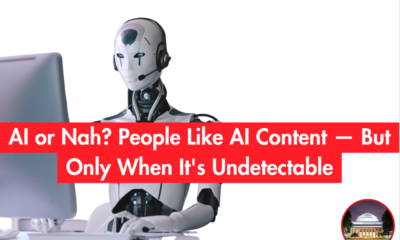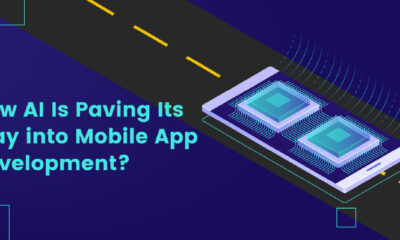Internet & Online Marketing
The Infusion of Artificial Intelligence in Content Marketing
Amanda Jerelyn is currently working as an Information & Technology tutor at Crowd Writer, an excellent house of best assignment writers UK. As a teacher previously, she was always interested in combining education with technology. Having done extensive research, she now shares her opinions on her blog with a pool of followers.

Artificial Intelligence is bringing drastic changes probably in every aspect of life. Not only the working sector but, it has improved the living standards. You can now simply by your voice just switch off/on your electronic gadgets, i.e., introduction to smart houses. Use of AR & VR has made it easy to visualize so many things. Along with that, AI has influenced education sector, way of marketing, health department and many others.
The sense of predictability makes it stand tall among all the other advancements of this century. Machine learning has implemented AI possible. The more we explored ML, it produces numerous ways for the improvement of computerized objects. From automation to predicting behaviors is all that machine learning has made it easy for us. Let’s have a brief look at what AI and ML actually are.
A Synopsis To Artificial Intelligence and Machine Learning
Artificial Intelligence is basically a computer field based for creating intelligent machines. It can learn from previous experience, can have an idea of future behavior and can understand what is going on for now, simply what human can do. It reacts based on its input and future predictions. Face and voice recognition is the most common example of AI.
On the other hand, machine learning can be understood as a subset of AI. It includes self-learning of a machine based on previous experiences and without explicit programming. It proceeds with the integration of output to input. It is like a closed loop circle, where input improves itself based on every particular output.
ML leads to learning new things from the provided data and acquisition of new knowledge whereas AI basically is based on decision making, smart learning and utilizing the knowledge supplied by ML to find optimal solutions.
Hopefully, it would have provided a better idea about AI, ML, and their interrelation. Now, what we will be discussing today is how Artificial Intelligence prediction has provided solutions for content marketers.
Artificial Intelligence and Content Marketing
If you have ever been involved in marketing, you would have an idea, what it takes to come up with content, marketing it to the right people and analyzing your marketing campaigns. What if you are provided with a platform that can perform all these tasks for you? Yes, this is actually what Artificial Intelligence does for content marketers.
1. Personalizing Your Content
Consumers always expect highly interactive and unique content from the retailer brands. Engaging content is no doubt a key for a brand to boost up their conversions. However, about 60% of marketers find it challenging to cope up with personalized content for their users.
Since the digitalization, it has become easy to access potential customers, and marketers have noticed the trend. Many companies are setting up tools that enable marketing automation to provide users with a better experience.
According to statista, 90% of people in the US find personalized content appealing in contrast to the 4% who doesn’t find it attractive.
2. Content Creation Readers
Content is usually created by guesswork. Marketer analyzes what could be substantial and appealing for the audience based on their past experience, interest, and searches. AI helps you to come up with more valuable content based on appropriate keywords and trending searches. It merely reduces the time to create the type of content which will have a higher engagement rate.
Customer’s expectation and interests can be altered based on different things. Hence it is required for the marketers to come up with the relevant content every time. You can use AI to identify the trending topics and content for your product description, landing pages, blogs, and articles. That’s what so many companies like Fox and The Associated Press have been doing.
3. Content Curation for Google
Accordingly, with the ever-changing SEO and social media algorithms, content marketing best practices are always evolving. AI let you cope with appropriate context, and smart content that is intelligently personalized based on customers need and smartly optimized based on google requirements.
It saves a lot of time when almost your content is created automatically. What you just need is to give it a final touch, and it is ready to bring you conversions. And now in the presence of content curating tools such as Grammarly and Australian Master, your job has become more convenient.
4. Boosted Engagements Through Chatbots
You may or may not have an idea that you would have chatted a bot somewhere on the internet while purchasing, or pursuing any item. This is the accuracy that AI provides us with the usage of chatbots. Unlike humans, they analyzed a customer within no time and answered the query based on their past conversations. Hence, user experiences better customer support with a real-time response which ultimately results in improved engagements and better conversion rate.
5. Automation of Repetitive Tasks
Without a doubt, to stand tall amongst your competitors, you need to collect a lot of data and analyze it for creating better content for your users. AI helps you to plan, analyze, create and promote your content. You can utilize AI for the process that needs to be done all the tie, for example, collection of data and its analysis. It will save you a lot of time, efforts and money.
Apart from them, marketers find that consistent marketing is the key to success. According to Forbes brands with consistent marketing worth 20% more than the brands with inconsistent marketing. You can simply automate your process of marketing through AI with slight changes in the content to improve the user experience. You even, do not need to mark changes in the material every time manually. The content creating abilities of AI could also do it.
6. Data Analysis To Leverage Insights
Data is the most valuable source in the current days for marketers. It decides the impact your content is creating on the users. AI not only helps you to collect the data but also enables you to analyze for the maximized optimization. Let’s discuss some tools and techniques that can help to analyze and utilize the information for useful insights.
a) Driver Analysis
This analysis is the result of Chris’ research who is the co-founder of Trust Insights. He examined the complete content of a website to determine which the most useful one is. He utilizes machine learning and R programming to analyze all the data for finding out the best mathematical combination. He concluded that for Spin Sucks (a marketing blog) email marketing is the most helpful for generating leads.
b) Text Mining
In order to examine the content for keywords and topics, text mining is the best strategy. It uses vectorization which helps to convert the content in numbers. Then it analyzes all the numbers for mathematical relations among them. Finally using deep learning, it provides the similarity among the words.
c) Google Reverse Engineering
It is a subcategory of text mining technique that can reveal the google searched keywords.
We all know Google’s search algorithm is much typical to understand. It is an AI-based deep learning system which no one knows how it works. By using google reverse engineering, you can determine what words 10 or 20 pages have in common.
d) AI Marketing Assistant Max
Max is one of the best tools that analyzes your data to provide actionable insights. It utilizes AI deep learning to manage your data and does predictive analyses.
-
- It recommends you the best channel for your marketing campaign based on your previous data.
- It organized your data based on your preferences. You can determine the information on the basis of time, day, region, audience and attributes.
- It focuses your objective for data collection. It targets the report based on your aim and Google’s analytics which is best for boosted engagements and increased conversion rates.













